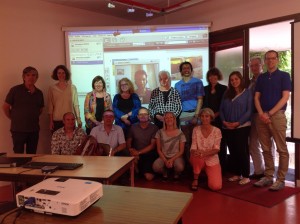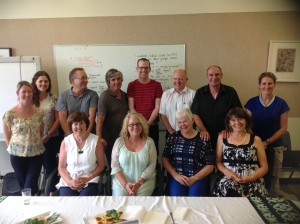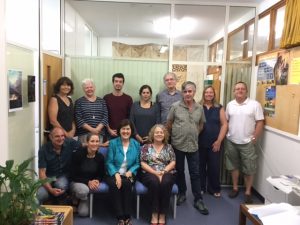Lifelab
One of our flagship projects is Lifelab. LifeLab project
LifeLab projectenGasia resources

Try out some of HTML5 geometry proof pages made for the British Academy enGasia project.
Communication About SocioScientific Issues (CASSIS)
Communication About SocioScientific Issues (CASSIS) is a 4-year EU-funded project under the International Research Staff Exchange Scheme, which aims to improve communication about socioscientific issues (SSIs) between people with opposing views, to help them to develop collaborative reflections and to improve their reasoning when integrating wider perspectives. The partner institutions are the University of Southampton and the Institute of Education, London in the UK, the Ecole Nationale de Formation Agronomique in France and the University of Auckland in New Zealand.
The context for the research project is the potential conflict that can arise when people’s views about agriculture, sustainable practices, animal welfare and conservation intersect. For that reason, we are using the problem of controlling ‘pest animals’ when they influence farming practices, as an overarching theme across the 3 participating countries. While on the surface the problem is about pest control in the three countries they raise very different questions with different constituencies in the public sphere. The goal of this research is for the four universities to collaborate in developing a working model of communication that will be transferable to other socioscientific issues.
The specific objectives of this exchange programme are to:
- develop conceptual and theoretical underpinnings for a revamped and broadened view of socioscientific issues (SSIs);
- develop a common methodological framework to collect and analyse data from Europe and New Zealand that will provide an international data source for extensive analysis;
- inform the communication model with these data;
- develop pedagogical communicative strategies to support constructive communication about SSIs.
To date, we have organised seven workshops, the first hosted at the Southampton Education School in January 2014 where issues focusing on the theoretical framework for analysing and communicating socio-scientific issues were discussed.
The second workshop took place in July 2014 and was hosted by Professors Laurence Simonneaux, Jean Simonneaux and their research team at the Ecole Nationale de Formation Agronomique, France. During this time each time presented their progress to date, we focused on developing further our theoretical framework including the exploration of ethical frameworks and building cartographies for exploring controversial issues and finally, we learnt more about the issue of ‘wolves as pest animals’ in France.
Our third workshop took place in Auckland, NZ during January 2015 and was hosted by Bev France and her research team at the University of Auckland. During this workshop,the team has discussed and developed a list of methodologies for collecting data of students’ perceptions of nature, risk and the three socio-scientific issues we are focusing on. Part of this work and the work conducted during the second workshop was presented by Dr Bev France and Dr Sally Birdsall at the 46th Australasian Science Education Research Association (ASERA) conference at the University of Western Australia in July 2015. During this time, we have also organised and submitted a symposium on the issues explored entitled Building a cartography about a SocioScientific Issue (SSI)/Socially Acute Question(SAQ), which was successfully accepted and presented at the ESERA 2015 conference, in Helsinki, Finland.
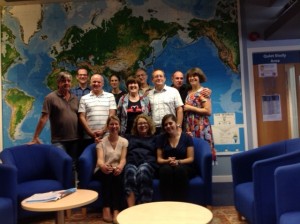 In July 2015, Prof Marcus Grace and Dr Andri Christodoulou hosted the forth workshop of our project at the University of Southampton. This workshop focused on data analysis frameworks that could be applied to make sense of students’ emerging views of the nature of the controversies in each of the three contexts we are investigating. We have also discussed how pedagogical communicative strategies could be applied based on work conducted in each of the three countries. Finally, a presentation given by Prof Nick Sotherton from the Game & Wildlife Conservation Trust, provided important insights to the issue of the badger cull in the UK.
In July 2015, Prof Marcus Grace and Dr Andri Christodoulou hosted the forth workshop of our project at the University of Southampton. This workshop focused on data analysis frameworks that could be applied to make sense of students’ emerging views of the nature of the controversies in each of the three contexts we are investigating. We have also discussed how pedagogical communicative strategies could be applied based on work conducted in each of the three countries. Finally, a presentation given by Prof Nick Sotherton from the Game & Wildlife Conservation Trust, provided important insights to the issue of the badger cull in the UK.
In January 2016, Dr Ralph Levinson, Dr Paul Davies, and Joanne Nicholl hosted the fifth CASSIS workshop at UCL Institute of Education. The team spent time reporting on the analysis and findings of a common methodology applied in each of our three contexts for exploring students’ views of nature and pest animals. Part of this work was also later reported by Prof Laurence Simonneaux and Prof Jean Simonneaux at the 11th Conference of European Researchers in Didactics of Biology (ERIDOB) in Karlstad, Sweden in September 2016. The University of Auckland team presented the work conducted as part of their local project ‘PEST – People Engaging with Science and Technology’ funded by the Ministry of Business, Innovation & Employment, NZ under the Unlocking Curious Minds scheme. The doctoral researchers in our team also presented their work to date on their projects and received feedback and discussed ideas with the other project members. Finally, we had the opportunity to share and discuss theoretical and practical implications of our work with invited speakers Dr Jerry Ravetz and Sun-Kyung Lee, Cheongju National University of Education, South Korea.
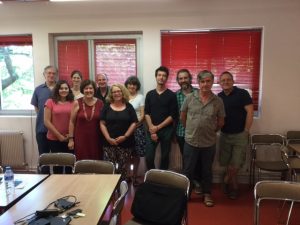 The sixth workshop of our project took place in July 2016 and was hosted by Prof Laurence Simonneaux, Prof Jean Simonneaux, Lucas Nedelec and Dr Michel Vidal at the Ecole Nationale Supérieure de Formation de l’Enseignement Agricole, in Toulouse, France. The main focus of our work during this time was the sharing and discussion of the first implementation in our three contexts of a protocol for promoting communication about socio-scientific issues around pest animals. This resulted in a common communication model for ‘pest’ animal controversies, which we then implemented in international exchanges between England, France and New Zealand students. Our communication model includes pedagogical and communicative strategies such as mapping controversies and online asynchronous communication between students from the three countries. Part of this work entitled ‘Communicating about socio-scientific issues: UK students’ mapping of the badger-cattle controversy’ will be presented by Dr Andri Christodoulou and Dr Ralph Levinson at the Annual International NARST conference in San Antonio, TX, USA in April 2017. Finally, invited speaker Laurent Hazard, Directeur de Recherche, INRA, Toulouse, gave a presentation with the title ‘Reflecting on genetics in action – how to match knowledge production and design?’ and discussed with the team his reflections on our project’s aims and implications.
The sixth workshop of our project took place in July 2016 and was hosted by Prof Laurence Simonneaux, Prof Jean Simonneaux, Lucas Nedelec and Dr Michel Vidal at the Ecole Nationale Supérieure de Formation de l’Enseignement Agricole, in Toulouse, France. The main focus of our work during this time was the sharing and discussion of the first implementation in our three contexts of a protocol for promoting communication about socio-scientific issues around pest animals. This resulted in a common communication model for ‘pest’ animal controversies, which we then implemented in international exchanges between England, France and New Zealand students. Our communication model includes pedagogical and communicative strategies such as mapping controversies and online asynchronous communication between students from the three countries. Part of this work entitled ‘Communicating about socio-scientific issues: UK students’ mapping of the badger-cattle controversy’ will be presented by Dr Andri Christodoulou and Dr Ralph Levinson at the Annual International NARST conference in San Antonio, TX, USA in April 2017. Finally, invited speaker Laurent Hazard, Directeur de Recherche, INRA, Toulouse, gave a presentation with the title ‘Reflecting on genetics in action – how to match knowledge production and design?’ and discussed with the team his reflections on our project’s aims and implications.
The 7th workshop for our project took place at the University of Auckland, NZ throughout January 2017. During this workshop we had the opportunity to work across national teams in developing analytical frameworks for the data collected during the implementation of the common communication model for ‘pest’ animal controversies, which we previously developed. The outcomes of this implementation and analysis resulted in a symposium (consisting of four proposed papers) submitted for the ESERA conference in Dublin, Ireland in August 2017. Another important outcome was the successful organisation led by Dr Bev France of a one-day international conference entitled Teaching contentious issues in science: a research-informed pedagogy, where we had the opportunity to present theoretical and pedagogical dimensions of our work, and current findings. The conference was well attended by researchers from the formal and informal education community.
For more information about our activities read the first issue of our CASSIS newsletter or contact us for copies of our working papers and conference presentations.
Partners
1. University of Southampton: Prof Marcus Grace, Dr Andri Christodoulou, Willeke Rietdijk
2. Ecole Nationale Supérieure de Formation de l’Enseignement Agricole: Prof Laurence Simonneaux, Prof Jean Simonnneaux, Amélie Lipp, Michel Vidal, Lucas Nedelec
3. UCL Institute of Education, University College London: Dr Ralph Levinson, Joanne Nicholl
4. University of Auckland: Associate Professor Bev France, Dr Sally Birdsall, Kathryn Garthwaite, Brent Wagner, Katie Gormley
